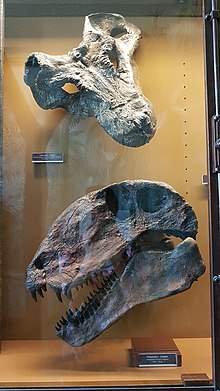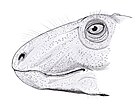Sphenacodontoidea
| Sphenacodontoids Temporal range: Late Carboniferous-Recent,
| |
|---|---|

| |
| Fossilized skull of two sphenacodontoids: Clelandina (Therapsida, Gorgonopsidae) and a Dimetrodon (Sphenacodontidae). | |
| Scientific classification | |
| Domain: | Eukaryota |
| Kingdom: | Animalia |
| Phylum: | Chordata |
| Clade: | Synapsida |
| Clade: | Sphenacomorpha |
| Clade: | Sphenacodontia |
| Clade: | Pantherapsida |
| Clade: | Sphenacodontoidea Marsh, 1878 |
| Clades | |
Sphenacodontoidea is a node-based clade that is defined to include the most recent common ancestor of Sphenacodontidae and Therapsida and its descendants (including mammals).[1] Sphenacodontoids are characterised by a number of synapomorphies concerning proportions of the bones of the skull and the teeth.[2][3]
The sphenacodontoids evolved from earlier sphenacodonts such as Haptodus and Ianthodon via a number of transitional stages of small, 1-10 kg, faunivore animals.[1] The possible common ancestor of sphenacodontids and therapsids was a carnivorous synapsid that reached moderate or large size and more closely resembled the land-dominant Early Permian sphenacodontids than the small Haptodus.[2] The first predators among Sphenacodontoidea, like Shashajaia, appeared in the tropical western part of Pangea in the Late Carboniferous.[1] Later, in Permian, sphenacodontoids gave rise to the dominant terrestrial carnivores in both sphenacodontid and therapsid groups.[2]
Classification
[edit]The following taxonomy follows Fröbisch et al. (2011) and Benson (2012) unless otherwise noted.[4][5]
Class Synapsida
- Sphenacodontoidea
- Family †Sphenacodontidae
- Therapsida
Phylogeny
[edit]Sphenacodontoidea in a cladogram modified from Huttenlocker et al. (2021):[1]
See also
[edit]References
[edit]- ^ a b c d Huttenlocker, A. K.; Singh, S. A.; Henrici, A. C.; Sumida, S. S. (2021). "A Carboniferous synapsid with caniniform teeth and a reappraisal of mandibular size-shape heterodonty in the origin of mammals". Royal Society Open Science. 8 (12): 211237. Bibcode:2021RSOS....811237H. doi:10.1098/rsos.211237. PMC 8672069. PMID 34925870.
- ^ a b c R. R. Reisz, David S Berman, Diane Scott (1992). "The cranial anatomy and relationships of Secodontosaurus, an unusual mammal-like reptile (Synapsida: Sphenacodontidae) from the Early Permian of Texas". Zoological Journal of the Linnean Society. 104 (2): 127-184. doi:10.1111/j.1096-3642.1992.tb00920.x.
{{cite journal}}: CS1 maint: multiple names: authors list (link) - ^ "Autapomorphies of the main clades of synapsids". Tolweb. Archived from the original on October 27, 2023.
- ^ Jörg Fröbisch; Rainer R. Schoch; Johannes Müller; Thomas Schindler; Dieter Schweiss (2011). "A new basal sphenacodontid synapsid from the Late Carboniferous of the Saar-Nahe Basin, Germany" (PDF). Acta Palaeontologica Polonica. 56 (1): 113–120. doi:10.4202/app.2010.0039.
- ^ Benson, R.J. (2012). "Interrelationships of basal synapsids: cranial and postcranial morphological partitions suggest different topologies". Journal of Systematic Palaeontology. 10 (4): 601–624. doi:10.1080/14772019.2011.631042. S2CID 84706899.
Further reading
[edit]- Laurin, M. and Reisz, R. R., 1997, Autapomorphies of the main clades of synapsids - Tree of Life Web Project
External links
[edit]- "Synapsida". Mikko's Phylogeny Archive. Archived from the original on September 3, 2007.






